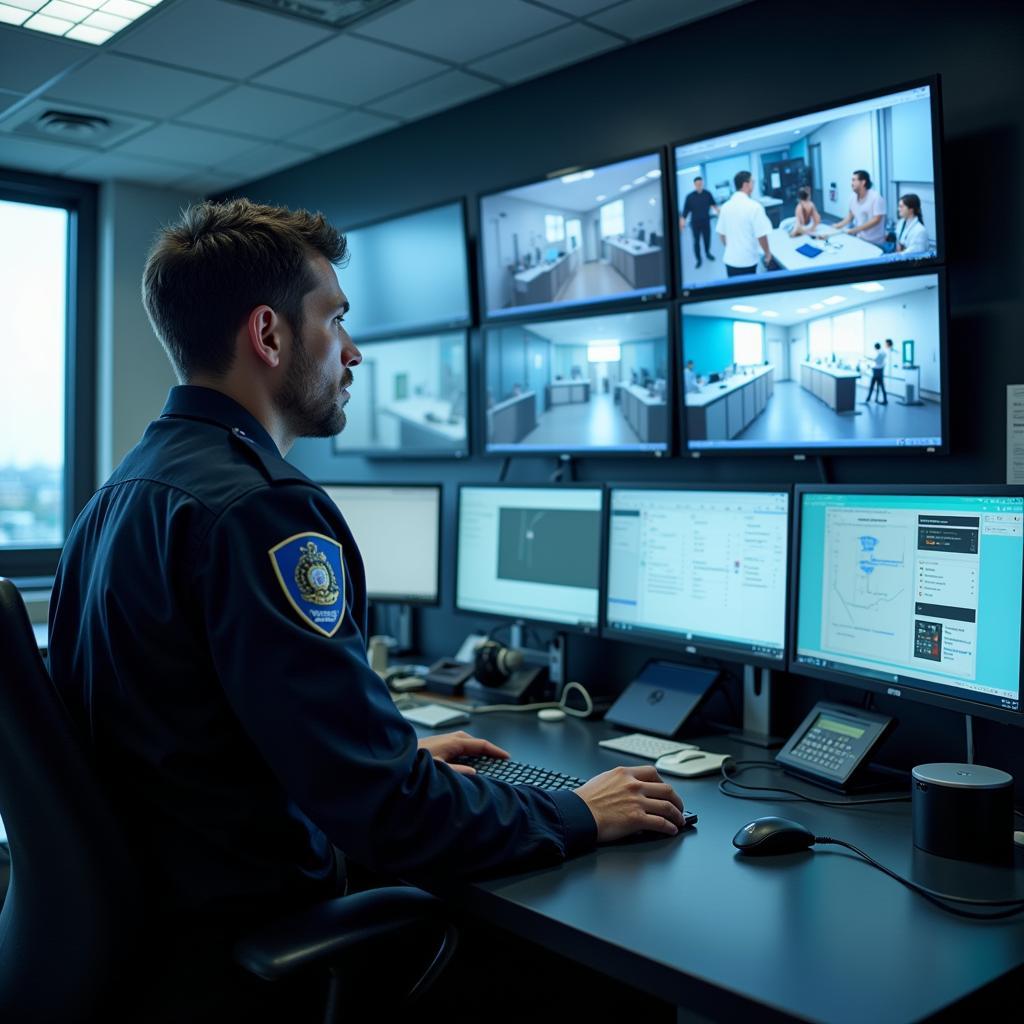Hospital Security Officers are essential for maintaining a safe and secure environment for patients, staff, and visitors. Their presence deters crime, responds to emergencies, and ensures the smooth operation of the hospital. This article will explore the crucial role these professionals play in modern healthcare. We will examine their responsibilities, the challenges they face, and the importance of their contribution to the overall patient experience. Read on to learn more about the dedicated individuals who protect our hospitals.
The Importance of Hospital Security Officers
Security at a hospital is paramount. Hospitals are often open 24/7, dealing with vulnerable individuals and sensitive information. This makes them potential targets for theft, violence, and other security breaches. Hospital security officers act as the first line of defense against these threats. They patrol the premises, monitor surveillance systems, and respond to any suspicious activity. Their visible presence serves as a deterrent, creating a safer environment for everyone. security at a hospital is not just about protecting physical assets; it’s about fostering a sense of security and well-being for everyone within the hospital walls.
Hospital security officers also play a vital role in emergency situations. They are trained to respond to medical emergencies, fires, and natural disasters. They assist in evacuations, provide first aid, and control crowds. In critical situations, their quick thinking and decisive actions can save lives.
Beyond emergencies, hospital security officers also contribute to the smooth daily operation of the hospital. They manage traffic flow, enforce parking regulations, and assist with patient and visitor inquiries. They are often the first point of contact for people entering the hospital, providing a welcoming and helpful presence.
Responsibilities of Hospital Security Officers
Hospital security officers have a diverse range of duties and responsibilities. Their core function is to protect people and property within the hospital. This includes:
- Patrolling the premises: Regularly patrolling the hospital grounds, both inside and outside, to identify and address potential security risks.
- Monitoring surveillance systems: Observing security cameras and other surveillance equipment to detect suspicious activity and respond accordingly.
- Responding to emergencies: Providing immediate assistance in medical emergencies, fires, and other critical situations.
- Enforcing hospital policies: Ensuring compliance with hospital regulations and safety protocols by staff, patients, and visitors.
- Investigating incidents: Conducting thorough investigations into security breaches, thefts, and other incidents.
- Maintaining order: Managing crowds, resolving conflicts, and ensuring a peaceful environment within the hospital.
Beyond these core responsibilities, hospital security officers also play a crucial role in patient care. They often assist with patient transport, escort patients to appointments, and provide support to medical staff. Their interactions with patients contribute to a positive patient experience. Learn more about security at hospital.
Challenges Faced by Hospital Security Officers
Hospital security officers face unique challenges in their line of work. They deal with a diverse population of patients, visitors, and staff, each with their own needs and concerns. They must be able to communicate effectively with people from all walks of life, often in stressful situations. The environment can be unpredictable, and they must be prepared to respond to a wide range of incidents, from minor disturbances to life-threatening emergencies.
Another challenge is the increasing complexity of security threats. Hospitals are increasingly reliant on technology, making them vulnerable to cyberattacks and data breaches. Hospital security officers must be trained to identify and mitigate these risks. The emotional toll of the job can also be significant. They witness human suffering, deal with aggressive individuals, and are often exposed to traumatic situations.
 Hospital Security Officer Monitoring Surveillance
Hospital Security Officer Monitoring Surveillance
The Future of Hospital Security
The role of hospital security officers continues to evolve. With the rise of new technologies and the increasing complexity of security threats, these professionals must adapt and enhance their skills. The future of hospital security will likely involve greater integration of technology, including artificial intelligence, facial recognition software, and advanced surveillance systems.
hospital security duties and responsibilities also entail training in cybersecurity and data protection. As hospitals become more interconnected, security officers will play a crucial role in safeguarding sensitive patient information and protecting against cyberattacks. Additionally, there will be a greater emphasis on de-escalation techniques and conflict resolution. Hospital security officers will be trained to manage challenging situations peacefully and effectively, minimizing the use of force whenever possible.
Conclusion
Hospital security officers are invaluable members of the healthcare team. They are essential for maintaining a safe and secure environment for patients, staff, and visitors. Their dedication, professionalism, and commitment to protecting others make a significant contribution to the overall patient experience. They deserve our recognition and appreciation for their unwavering commitment to ensuring the safety and well-being of everyone within the hospital walls. For information about jobs at torrance state hospital pa, visit our website.
FAQ
- What qualifications are required to become a hospital security officer?
- What is the average salary for a hospital security officer?
- What type of training do hospital security officers receive?
- What are the career advancement opportunities for hospital security officers?
- What are the most common challenges faced by hospital security officers?
- How do hospitals ensure the accountability of their security personnel?
- What is the role of technology in hospital security?
Scenarios
- Scenario 1: A visitor refuses to wear a mask and becomes disruptive.
- Scenario 2: A patient wanders off and becomes lost.
- Scenario 3: A suspicious package is found near the entrance of the hospital.
Further Reading
For more information on related topics, you can explore our articles on can you carry a gun into a hospital.
Need assistance? Contact us at Phone Number: 02437655121, Email: [email protected] Or visit us at: 298 Cau Dien St, Minh Khai, Bac Tu Liem, Hanoi, Vietnam. We have a 24/7 customer service team.